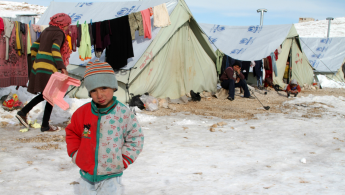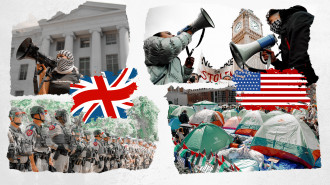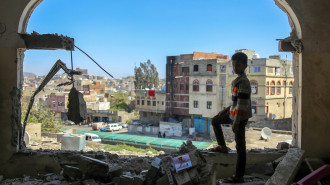Syria's refugees: 'We have nothing; winter is killing us'
"We have nothing and the winter is killing us," says one refugee.
This is how many describe their situation as the freezing weather approaches. They collect firewood and visit the UN's social services offices hoping to get some diesel fuel.
In one of the camps, five-year-old Hania warms her hands near a pot of boiling water. Her family came to Lebanon last year after her father was killed by a bomb as he collected food in the fields around Qalamoun.
| I'm cold and I want a bed. - Hania, five-year-old Syrian refugee |
Her story and her desperate conditions are shared by many here.
"We escaped the misery of war, and replaced it with the misery of homelessness and forced displacement in a strange and unsafe country," said a woman living here.
"In the winter we look for plastic bags to plug the holes in our tent. We have to stop the rain breaking through the wooden walls of our small room.
"The children have two changes of clothes, one they wear and the other we hide in case they need it. No one has given us anything to deal with winter, and we have no money to buy diesel.
"Medical centres in Bekaa told us two months ago they would stop providing services for Syrian refugees, and now we have to pay for medical treatment ourselves. A baby bottle is 15,000 Lebanese lira ($10), my baby has diarrhoea and the price of the medicine is 8,000 lira ($5).
"I don't have enough to pay for it."
Burning hunger
In a neighbouring tent, a young girl dances for joy as her father ignites their wood-burning stove.
She calls to her friend, five-year-old Hania, telling her of the new "toy" that will keep everyone warm. Hania dances when she hears this, saying with the innocence of her years that her father will too bring her a wood-burner.
In the next refugee camp along, more than 60 families are waiting for aid, promised months ago.
"We live off the land," said Abd al-Karim, the head of a family of eight. "We save up the meagre amount we can get our hands on and buy bulgur wheat, bread and drinking water, of which a tank costs 20,000 lira ($13)."
His young sister interjects. "I hate the rats because they eat our bread," she said. "Why don't they give us nice rooms like we used to have in Syria?"
The stories from refugees in the camps are all similar; they all share the same problems and suffer in the same way.
Rehab, who has nine children, says she wants to die when she sees her children suffering from diseases and cannot help them.
"My daughter is paralysed and has severe bronchitis," she said. "She needs constant treatment especially with her asthma attacks, which get worse in the cold."
Rehab's husband spends his time waiting on the side of the camp's main road for someone to pick him up and give him a day's work building or painting.
"Winter is cold and ruthless. Installing a wood-burner costs $50, not including the price of diesel, which I can't afford."
Rehab remembered last winter: "The tent fell on our heads and we all got wet. No one asked how we were, except for the owner of one the neighbouring factories. He gave us bricks to rebuild what the rain had destroyed."
This article is an edited translation from our Arabic edition.



